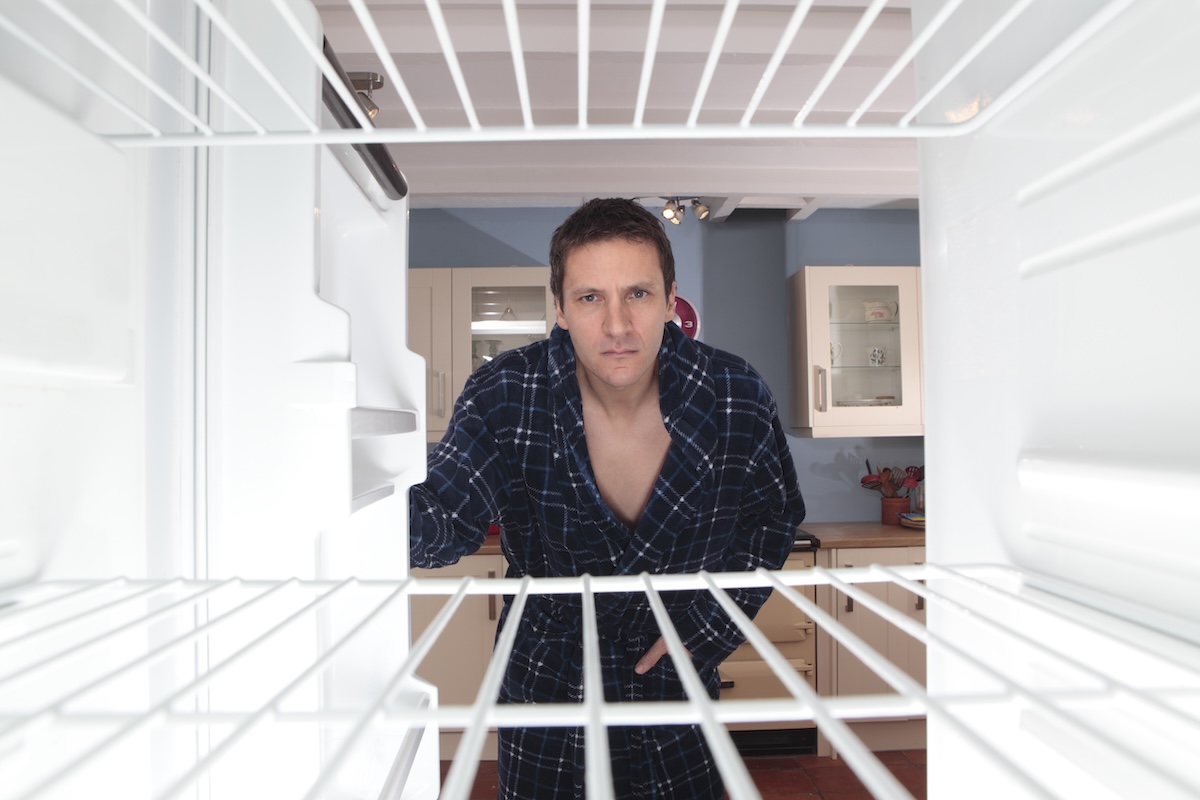

We may earn revenue from the products available on this page and participate in affiliate programs. Learn More ›
Refrigerators are one of the most important appliances in any functional household because they can help you store food for an extended time, allowing meat, vegetables, and more to remain edible for longer. Without the preservation function of a refrigerator, most households would need to shop for groceries on a daily basis, so it’s only natural to be concerned when your refrigerator starts making an unfamiliar sound.
While some fridge noises, like a low humming or buzzing sound, might just be due to the appliance’s normal operation, several sounds could indicate a problem with the appliance. If you have recently been wondering about the odd buzz, rattle, or hiss you’ve been hearing, this guide will help troubleshoot the cause of the noise and determine whether it’s worth calling a repair professional.
Fridge Noises and How to Troubleshoot Them
If you hear any of the sounds below, take heed—and either seek to resolve the issue yourself or call in a professional appliance repairperson. Always make sure to disconnect the power to the refrigerator before taking any action. And keep in mind that attempting a DIY repair on a machine still under warranty could void the warranty—don’t risk it.
Grinding, Scraping, or Knocking
Generally, grinding, scraping, or knocking sounds can indicate an issue with the condenser fan (located in the bottom of the fridge), or the evaporator fan, which is found in the freezer compartment. The grinding or knocking noises could also be due to a bad compressor, loose components, or uneven placement of the refrigerator.
- The first thing to check when troubleshooting this problem is that the fridge is sitting on an even surface.
- The next step is to look for loose components, like loose screws or a loose drain pan. Tightening these components should resolve the noise issues.
- If the problem persists, disconnect the fridge and check the condenser and evaporator fans for signs of obstruction or damage. Sometimes these fans just need to be cleaned and lubricated to fix the problem, though in other cases they might need to be replaced.
- Compressor problems are more obvious because the fridge won’t just make odd noises, but will also have inadequate cooling, temperature fluctuations, and ice buildup on the freezer walls. In addition, the compressor unit might be hot to the touch and produce a burning smell. If the compressor is the source of the noise, you will need to call a pro to replace it.
Clicking, Buzzing, or Vibrating
A faulty defrost timer and heater can cause a clicking or ticking noise during the defrost cycle, but if the fridge is making buzzing noises and the ice maker has intentionally not been connected to a water supply, then it could be the cause of the noise. However, you might hear a similar sound from a compressor. Ian Palmer-Smith, Appliance Repair Expert at Domestic & General, explains that “it is normal for the compressor to make some level of noise, however, I recommend checking the compressor if the noise becomes significantly louder than usual.”
- If you suspect the problem is a disconnected ice maker, locate the metal shut-off arm or the on/off switch and move it to the “off” position to solve the problem.
- Identify issues with the defrost timer by manually advancing the fridge into a defrost cycle to verify if the compressor shuts off and the heater turns on. If you have a faulty defrost timer, you will need to have it replaced by an appliance repair professional.
- Failing compressors can make a variety of noises, but there are other clear signs, including poor cooling abilities, temperature fluctuations, freezer wall ice buildup, and overheating. Similar to the defrost timer, a bad compressor will need to be addressed by a repair professional.
Rattling

The cause of the rattling might be as simple as the sides or back of the fridge touching another surface like a wall or cabinet. Alternatively, your fridge might not be level. “A rattling noise can sometimes mean a part of the appliance has become loose or that the fan has become obstructed,” says Palmer-Smith. One common component that often loosens over time is the drain pan below the refrigerator.
- Pull the fridge out a few inches to give it some breathing room and place a level on the top of the fridge while you adjust the legs to ensure it is level.
- Inspect the fans, water lines, ice maker, and any other visible parts of the fridge for any loose components. Tightening these components should resolve the noise issues.
- If you have a loose drain pan, refer to your instruction manual for how to access the evaporator drain pan located below the refrigerator. Tighten the fasteners or even use duct tape for a quick fix to secure the drain pan in place.
Gurgling or Hissing
When the refrigerator is making a gurgling or hissing sound, it might just be the normal sound of refrigerant or water during the cooling and defrost cycles. However, these noises can also be related to a frozen evaporator coil, leaking refrigerant, or dust and dirt buildup on the evaporator coils, which can restrict airflow and force the refrigerator to work harder to keep the contents cool.
- Inspect the evaporator coils to determine if there is any visible dust, dirt, or ice on the coils. In some cases, cleaning the evaporator coils can resolve the problem.
- If your evaporator coils are frozen, you will need to turn off the fridge, remove the contents, and allow it to defrost naturally. During this time, check for any airflow issues or refrigerant problems that could be causing the coils to freeze, but don’t hesitate to call in a pro if you can’t solve the issue on your own.
- Leaking refrigerant is a serious issue, so if you notice an oily residue on the refrigerant line or hear a hissing sound and suspect the refrigerant is the source of the noise, unplug the fridge immediately, ventilate the area, and contact an appliance repair technician.
- If the refrigerant doesn’t appear to be leaking, then the levels might just be low, which would cause the evaporator coils to freeze. Call an appliance repair pro to inspect the refrigerant line and top up the refrigerant levels.
Silence
A fridge can be silent during defrost cycles or when the desired temperature is reached, but silence can also indicate an issue. Palmer-Smith says “if your fridge, which previously made noise, has become noticeably quieter, it could indicate an issue with the compressor, which will affect your fridge’s cooling capabilities.” Additionally, a silent fridge could be due to a broken defrost system or issues with the power supply and internal wiring.
- To check for a faulty compressor, look for insufficient cooling abilities, temperature fluctuations, freezer wall ice buildup, and overheating. A bad compressor will need to be addressed by a repair professional.
- If you suspect the problem is a broken defrost system, check visible damage or blistering on the defrost heater, as well as excessive ice buildup on the evaporator coils. You can also try manually advancing the timer dial into the defrost cycle to see if the heater activates. If the defrost system is faulty, plan to call in a pro for repairs.
- Electrical problems may be as simple to resolve as plugging in a loose power cord. However, you should also check the home’s electrical panel to make sure a breaker wasn’t tripped. If the fridge doesn’t start running normally again, it’s recommended to call a pro to replace the power supply or fix any damaged internal wiring, instead of trying to repair the fridge on your own.
FAQs
There are a few reasons why your refrigerator may suddenly grow louder, including a faulty compressor, problems with the condenser or evaporator fan, loose components, dirty condenser coils, a malfunctioning defrost timer and heater, or even something as simple as the fridge being on an uneven surface. If you notice the fridge is suddenly louder, then it’s a good idea to troubleshoot the problem based on the type of noise, then call a repair professional, if the problem seems beyond your skills.
A fridge making a humming noise isn’t necessarily a sign you need to replace your refrigerator. The appliance naturally makes noise as it works to cool the contents of the fridge and freezer. Some noises, however, can indicate a more serious issue. Palmer-Smith says that “you should worry about your fridge making noises if it starts to become louder or quieter than normal. The change in noise can often mean there is an underlying issue that needs addressing. If your fridge has become noisier or quieter and is over 10 years old, you might want to consider a replacement if possible.”
Professional appliance repair techs may be needed if the fridge motor is loud, the fridge is leaking, you notice strange odors, there is excessive ice buildup, or if the fridge is making noises that could indicate a serious problem.
This question is usually asked by folks deciding whether to repair or replace a refrigerator. A fridge making loud noises might indicate it needs repair, but depending on the age, it could be more cost-effective to replace the refrigerator. According to the U.S. Department of Energy, the average lifespan for a standard refrigerator is 12 years, so if you have a loud refrigerator that is approaching the end of its lifespan, it’s often better to invest in an upgrade.
